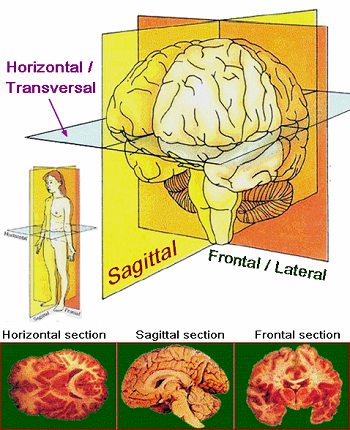Corticobasal Degeneration CBD
(Corticobasal Ganglionic Degeneration CBGD)
Again, Corticobasal Degeneration is a very rare dementia type. This neuro-degenerative disorder is similar to frontotemporal dementia in that it bears very strong clinical, genetic and pathological similarity. The death of nerve cells and atrophy of areas of the brain are factors common to all dementias.
Sufferers tend to be between the ages of 45 and 70 years of age. This makes it an early-onset dementia. Age is not regarded as being a factor leading to the degeneration of the brain in this disease and neither is Lifestyle.
Symptoms
The first indicators that a person may be suffering a condition indicative of CBD can be either physical or cognitive deficits.
From gentle beginnings a person may discover stiffness or jerkiness in limb movement. This progresses to uninitiated limb movement such as uncontrolled hand movement called Alien Hand Syndrome. As the brain continues to be damaged at the cortex or basal ganglia level this independent limb movement progresses to other limbs on the same side of the body. The sufferer will also tend to present with an increasing tendency to lose balance and be vulnerable to frequent falls.
 Corticobasal Degeneration
Corticobasal DegenerationTo an observer these symptoms will be a clear indication that there is something seriously wrong with the person. It is the cognitive deficits that will suggest a dementia of some type.
The cognitive deficit symptoms as the disease progresses can also bear a similarity to early stage Behavioural Covariant FTD (bvFTD). A person can become obsessive and behave and talk in a manner that is inappropriate. Corticobasal Degeneration is a disease that overlaps with FTD and shares some symptoms with Huntington's disease, especially personality changes, as mentioned above.
Language difficulties will become more and more apparent and the person will present with obsessive compulsive disorder and impulsiveness.
Cause and Progression of Corticobasal Degeneration
As the disease progresses it causes shrinkage in the cortex (outer layer) of the brain and the basal ganglia (deeper in the brain). You will have already read that Heinrich Lewy (Lewy Bodies) and Alois Alzheimer (Alzheimer's Disease) discovered a number of unusual proteins in the brain that cause behavioural and physical changes in a person. One protein in particular seems to be prevalent in a number of different types of dementia, namely Tau.
What causes the build-up of this cell toxic protein is not specifically known; however, it is thought that there may be a genetic initiator to its occurrence and its subsequent progress in causing irreversible injury to the brain. In Corticobasal Degeneration this comes in the form of shrinkage in brain and physical and cognitive symptoms.
Again, this dementia type is problematic in its early stages because it can be misattributed as Parkinson's Disease because of the physical symptoms. One indicator that it is not Parkinson's Disease is that the physical conditions do not respond to the drugs that can ameliorate the physical symptoms of PD.
Also, the cognitive deficits can also lead to an incorrect diagnosis because they are generalisable to a number of other dementia types. Based on the cognitive deficits CBD can be misdiagnosed as either Alzheimer's Disease or Frontotemporal Dementia (FTD).
Because the cause of Corticobasal Degeneration is not known there is currently no cure.
Return to Dementia Devotion DEMENTIA TYPES Page
Go to HOME PAGE

Recent Articles
-
Dementia Diary. We Must Break Her. It's my name she calls constantly
Dementia Diary. We’ve Got To Break Her.We had all agreed that we had to accept and commit ourselves to the hope that the dementia carers would become her family -
Dementia Diary Page 3. Love, Trauma and Laughter all within minutes
A Dementia Diary. The days that passed were full of Love, Laughter, Kindness and Exquisite Pain. Be ready to weep, laugh and, as usual, hate bastard rabbits. -
Dementia Devotion - Beautiful Karen Carpenter just ran out of time
Dementia Devotion - I keep thinking about beautiful Karen Carpenter who was so caught up in other people's demands that she ran out of time to save herself. -
Betty suffered dementia the last few years and was a very nice lady
Dementia Diary Day 31 Red Squirrels, Rabbits (again) & Suicide Salad - The first news I heard this evening from the Head Nurse, was that Betty had just died -
dementia diary day 30. Has The Mafia Assassin Revealed Her Identity?
Has The Dementia Care Home Assassin Revealed Her Identity? Her right eye was swollen, almost closed and the bruising ran from darkest blue, purple to black -
Dementia Diary Day 20 - Purpose, Futility & Bastard Rabbits!
Dementia Diary Day 20 - Purpose, Futility & the Bastard Rabbits! Eating My Garden







